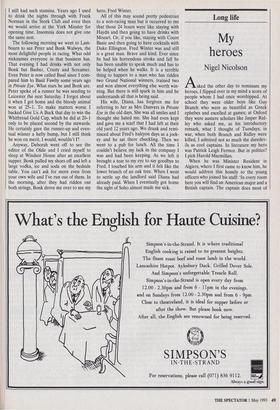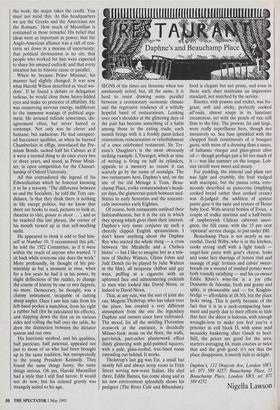Long life
My heroes
Nigel Nicolson
Asked the other day to nominate my heroes, I flipped over in my mind a score of people whom I had once worshipped. At school they were older boys like Guy Branch who were as beautiful as Greek ephebes and excelled at games; at Oxford they were austere scholars like Jasper Rid- ley who asked me, as his introductory remark, what I thought of Tuesdays; in war, when both Branch and Ridley were killed, I admired not so much the daredev- ils as cool captains. In literature my hero was Patrick Leigh Fermor. But in politics? I pick Harold Macmillan.
When he was Minister Resident in Algiers, where I first came to know him, he would address this homily to the young officers who joined his staff: 'In every room here you will find an American major and a British captain. The captain does most of the work: the major takes the credit. You must not mind this. At this headquarters we are the Greeks and the Americans are the Romans.' How much of Macmillan is contained in those remarks! His belief that ideas were as important as power; that the Anglo-American alliance was a raft of con- crete set down in a morass of uncertainty; that political deviousness is no sin; that people who worked for him were expected to share his amused outlook; and that every situation has its historic cause or parallel.
When he became Prime Minister, his manner had slightly changed. It was now what Harold Wilson described as 'tired wis- dom'. If he found a debate or delegation tedious, he would close those heavy-lidded eyes and make no pretence of affability. He was conserving nervous energy, indifferent to the immense wastage of political argu- ment. He aroused ridicule sometimes, dis- agreement often, but never hatred or contempt. Not only was he clever and humane, but audacious. He had unexpect- ed buccaneer qualities, as when he burned Chamberlain in effigy, introduced the Pre- mium Bonds, sacked half his Cabinet as if it were a normal thing to do once every two or three years, and stood, as Prime Minis- ter, in open competition for the Chancel- lorship of Oxford University.
All this contradicted the legend of his Edwardianism which he fostered knowing it to be a travesty. 'The difference between us and the Socialists', he told the Tory can- didates, 'is that they think there is nothing in life except politics, but we know that there are books to read, pictures to look at, theatres to visit, grouse to shoot ...7, and as he reached this last phrase, the corner of his mouth turned up in that self-mocking smile.
He appeared to think it odd to find him- self at Number 10. 'I recommend this job,' he told the 1922 Committee, as if it were within the reach of anyone who wanted. 'I sit back while everyone else does the work.' More profoundly, he thought of his pre- miership as but a moment in time, when for a few years he had it in his power, by slight deflections of the rudder, to change the course of history by one or two degrees, no more. Democracy, he thought, was a clumsy instrument, incapable of cutting sharp angles. Once I saw him take from his left-hand pocket a matchbox, from his right a rubber ball (for he calculated his effects), and slapping down the first on its various sides and rolling the ball over the table, he drew the distinction between the dictator system and our own.
His histrionic method, and his qualities, half patrician, half paternal, appealed not just to those of us who had been brought up in the same tradition, but unexpectedly to the young President Kennedy. They found the same things funny, the same things serious. Oh yes, Harold Macmillan had a style that I still find heroic. It would not do now, but his relaxed gravity was strangely suited to his age.



























































 Previous page
Previous page